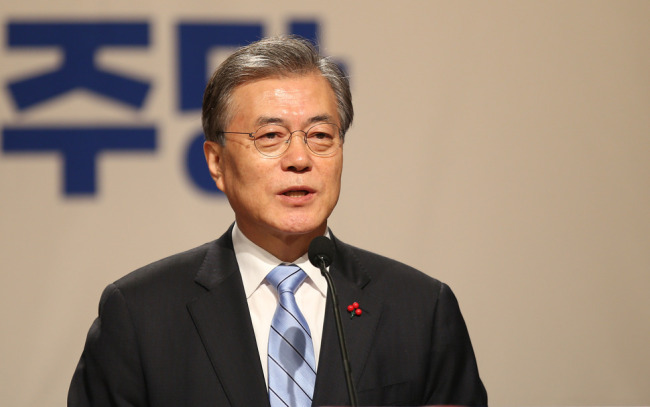Moon seeks ratification of inter-Korean joint statement at National Assembly
By Jo He-rimPublished : April 30, 2018 - 20:43
President Moon Jae-in on Monday urged the National Assembly for a swift ratification of the Panmunjeom Declaration, which came after the historic inter-Korean summit with North Korean leader Kim Jong-un, in order to make sure the agreement is legally implemented.
But his plan looks set to face an uphill battle, as it faces strong backlash from the main conservative opposition,
“Please quickly take the steps needed to ratify and promulgate the joint statement according to the Development of Inter-Korean Relations Act. Be aware that it is a legal process, not a political one,” Moon said in a weekly meeting with his aides.
But his plan looks set to face an uphill battle, as it faces strong backlash from the main conservative opposition,
“Please quickly take the steps needed to ratify and promulgate the joint statement according to the Development of Inter-Korean Relations Act. Be aware that it is a legal process, not a political one,” Moon said in a weekly meeting with his aides.

Moon had previously ordered at a preparation committee meeting last month to prepare to ratify the joint statement if such an outcome is reached. The presidential office seeks to pass the law in accordance with the Development of Inter-Korean Relations Act, which requires the president to promulgate the law after ratification.
Rep. Woo Won-shik, the floor leader of the ruling Democratic Party of Korea, reiterated the need to ratify the joint statement and vowed to make efforts to pass the bill at the National Assembly.
“To make sure the joint statement leads to irreversible and practical outcomes, we will lead the work to establish the system to back it, and if needed we will also review ratifying the statement at the National Assembly,” Rep. Woo said at a party meeting Monday.
He also criticized the main opposition Liberty Korea Party for its vocal criticism of the inter-Korean summit.
Accusing the Moon administration of putting up a false show of peace, the Liberty Korea Party has said that it cannot support the results of the inter-Korean summit.
“There is no other explanations to whether North Korea will give up on their nukes, except for the abstract sentence, ‘complete denuclearization’ in the statement,” Hong Joon-pyo, the leader of the conservative party, said in a press conference Monday.
Hong also claimed that the “abnormal” agreement between the two Koreas was possible with secret negotiations between the “national liberation front” of the South and North. The hard-line conservative leader has called the inter-Korean summit a “fake show” orchestrated by Kim Jong-un and the Moon administration.
“They wrote down what Kim Jong-un read for them as the joint statement,” he said, only a couple of hours after the leaders of the two Koreas announced their joint statement Friday.
The ratification of the joint statement would allow the agreement between the two Koreas to have legal and lasting influences, political commentator Yu Chang-seon told The Korea Herald.
“There have been past joint declarations drawn out by liberal governments in the past, but it appeared to go back to square one when the conservative administration took office. So having the joint statement ratified will allow the joint statement to have legal and lasting power,” he said. “But it would also be hard to obtain support from the main opposition, as it also appears as a very political and symbolic action as well."
All other political parties, including the center-right Bareunmirae Party, praised the results Friday, expressing support for the need to ratify the statement.
Considering that only the conservative Liberty Korea Party opposes the ratification of the inter-Korean agreement, passing the legislature at the National Assembly appears to be possible. According to law, the ratification needs support from a majority of existing lawmakers, which is 147 lawmakers out of the current 293.
While the Liberty Korea Party holds 116 parliamentary seats, the ruling Democratic Party has 121 parliamentary seats, the center-left Party for Democracy and Peace has 14 seats, the far-left Justice Party has six seats and the far-left minor Minjung Party has one. With votes from supporters of the center-right Bareunmirae Party, National Assembly Speaker Chung Sye-kyun and independent lawmakers, the parliament could pass the ratification bill.
“While there may not be a procedural problem blocking the passage of the ratification at the National Assembly, if they lack the support from the other half of the lawmakers, the parliamentary legitimacy of the joint declaration may be watered down, so it would be best to persuade the conservative Liberty Korea Party,” Yu added.
By Jo He-rim (herim@heraldcorp.com)



![[Exclusive] Korean military set to ban iPhones over 'security' concerns](http://res.heraldm.com/phpwas/restmb_idxmake.php?idx=644&simg=/content/image/2024/04/23/20240423050599_0.jpg&u=20240423183955)

![[Graphic News] 77% of young Koreans still financially dependent](http://res.heraldm.com/phpwas/restmb_idxmake.php?idx=644&simg=/content/image/2024/04/22/20240422050762_0.gif&u=)



![[Pressure points] Leggings in public: Fashion statement or social faux pas?](http://res.heraldm.com/phpwas/restmb_idxmake.php?idx=644&simg=/content/image/2024/04/23/20240423050669_0.jpg&u=)










